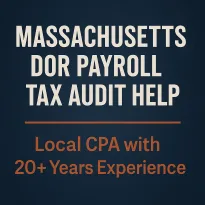Full Case Study: How I Helped a Boston Client Survive a Massachusetts DOR Sales Tax Audit
When a Boston business owner came to me, they were on the brink of collapse. They had received a Massachusetts Department of Revenue (DOR) sales tax audit notice. The proposed numbers were staggering—well into six figures—and the levy threats were already on the table. The business owner confessed: “I don’t have a bookkeeper. My QuickBooks is a disaster. I can’t even find half of my bank statements. I don’t know what to do.”
This is the kind of nightmare scenario that keeps business owners up at night. Fortunately, with more than 20 years of experience as a CPA in Massachusetts handling sales tax audits, I’ve seen it all before. Here’s how I helped.
Why the Massachusetts DOR Audits
The Massachusetts DOR doesn’t knock on your door randomly. In this client’s case, multiple risk factors triggered the audit:
- Inconsistent sales tax filings year over year.
- Discrepancies between reported sales and credit card processor totals.
- Late and missing returns.
- An industry—restaurant/retail—that the DOR often targets.
The DOR relies heavily on data-matching and industry comparisons. When your reported sales don’t match what third parties report (merchant processors, 1099-K forms, POS systems), it raises red flags.
The Audit Notices
The first letter was a Notice of Intent to Assess (NIA). This document listed multiple years under review. If ignored, it would roll into a Notice of Assessment (NOA)—an enforceable bill with levy power.
This client panicked and called the auditor directly. That was a mistake. On the phone, they admitted their books were a mess and that exemption certificates were missing. This gave the auditor cover to assume every sale was taxable.
I stepped in immediately and told the client: “m going to take that burden off your shoulders. No need to call him any more. From here on out, I speak to the auditor, so you don’t have to.”
The State of the Records
This was a true worst-case scenario:
- No bookkeeper.
- QuickBooks unreconciled for over a year.
- Bank statements missing.
- POS reports incomplete.
- Exemption certificates scattered or lost.
Without intervention, the DOR would have defaulted to indirect estimation methods:
- Bank deposit analysis: assuming every deposit equals taxable sales.
- Markup studies: comparing purchases to reported sales and inflating revenue.
- Sampling projections: taking one bad quarter and applying it across multiple years.
- Industry benchmarks: assuming their profit margins should match state averages.
All of these methods favor the state and can double or triple what’s actually owed.
Reconstructing the Books
The only path forward was a complete rebuild:
- I went with the client to the bank to request years of missing statements.
- We pulled merchant account and processor data to compare against reported returns.
- I rebuilt the general ledger line by line.
- POS data was reconciled with deposits.
- Exemption certificates (Forms ST-4 and ST-12) were tracked down or reissued by customers.
This reconstruction process turned chaos into defensible numbers. Without it, the auditor’s inflated methods would have destroyed the business.
Containing the Audit
I managed all auditor communications. I set boundaries on the scope, limited unnecessary fishing expeditions, and focused on reconciling legitimate discrepancies.
The DOR’s initial claim was more than six figures. After showing that many deposits were loan proceeds, intercompany transfers, or exempt sales, the auditor had to back down. Piece by piece, the liability shrank.
Fighting Levies and Penalties
At the same time, the client was facing levy threats. I requested an immediate collection hold while the audit was active. This stopped bank freezes and wage levies.
Penalties were another hurdle. Massachusetts imposes a 20% underpayment penalty plus interest. But penalties can be abated for reasonable cause. I argued:
- The client was inexperienced, not fraudulent.
- They made good faith efforts but lacked professional guidance.
- They had cooperated fully once proper representation was in place.
Many penalties were successfully abated, saving thousands.
The Resolution
In the end:
- The six-figure liability was cut down to a fraction.
- Exempt sales were reinstated with recovered certificates.
- Inflated assumptions were eliminated.
- A structured payment plan handled the balance.
The client kept their business, avoided levies, and walked away wiser about compliance.
FAQs (Based on Real Audit Issues)
Massachusetts DOR
Audit — FAQs
Normally three years, but up to six if discrepancies exist, and unlimited if no returns or fraud are suspected.
It starts with a Notice of Intent to Assess (NIA). If unresolved, it becomes a Notice of Assessment (NOA). At that point, levies and liens are possible.
The DOR will estimate using bank deposits, markup studies, or sampling. These methods almost always inflate what’s owed.
The burden of proof is on you. Without valid ST-4 or ST-12 forms, the DOR assumes every sale is taxable.
Up to 20% of underpaid tax plus interest. With CPA defense, many penalties can be reduced or abated.
Yes. You can request a conference, file an abatement, or escalate to the Massachusetts Appellate Tax Board.
Restaurants, contractors, retailers, and e-commerce businesses are frequent audit targets.
Anywhere from 3 months to over a year depending on complexity and cooperation.
Ignoring leads to default assessments, liens, and levies. You lose your chance to defend yourself.
No. Let your CPA communicate for you. Anything you say can be used against you.
Yes. Additional years and additional tax types can be pulled in.
Gather bank statements, POS reports, exemption certificates, and call a CPA right away.
Yes. Interest continues to accrue until the balance is paid. This makes timely resolution critical.
Yes. The Voluntary Disclosure Program allows businesses to come forward, limit lookback periods, and reduce penalties.
Yes. Businesses must maintain a valid Business Certificate (DBA) with the City Clerk and have the right local permits.
Why You Need a CPA in Massachusetts for Sales Tax Help
This case proves that handling a Massachusetts DOR sales tax audit on your own is dangerous. Auditors are trained to maximize assessments. Without proper defense, you risk levies, inflated liabilities, and permanent damage to your business.
A CPA can:
- Rebuild missing books
- Protect you from overestimation
- Negotiate penalty abatements
- Handle all communications
- Prevent levies and liens
Call to Action
If you’re facing a Massachusetts DOR sales tax audit, don’t wait for levy notices to hit. Get help from a CPA who knows how to fight back.


